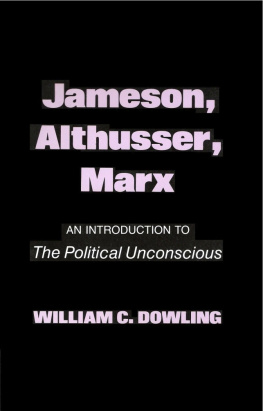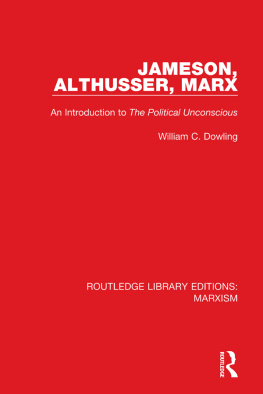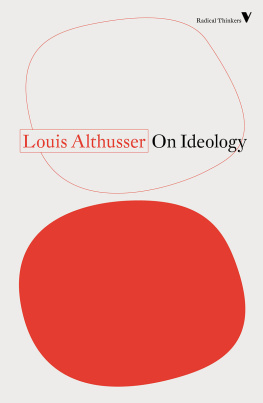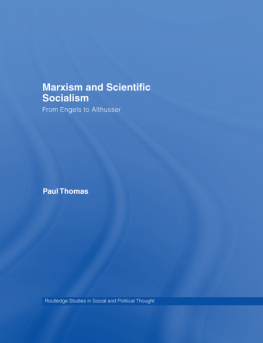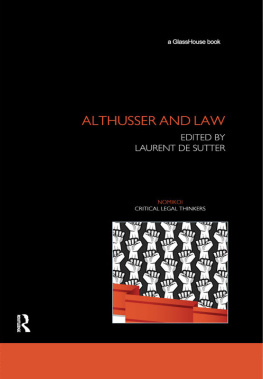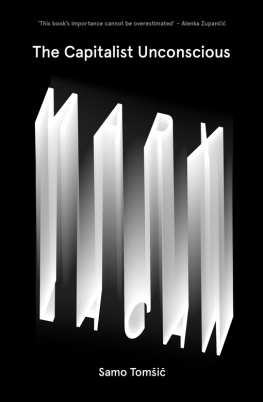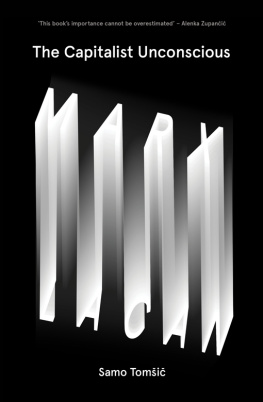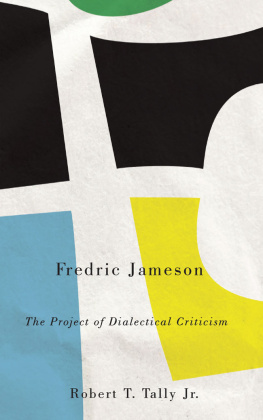William C. Dowling - Jameson, Althusser, Marx: An Introduction to the Political Unconscious
Here you can read online William C. Dowling - Jameson, Althusser, Marx: An Introduction to the Political Unconscious full text of the book (entire story) in english for free. Download pdf and epub, get meaning, cover and reviews about this ebook. year: 1984, publisher: Cornell Univ Press, genre: Religion. Description of the work, (preface) as well as reviews are available. Best literature library LitArk.com created for fans of good reading and offers a wide selection of genres:
Romance novel
Science fiction
Adventure
Detective
Science
History
Home and family
Prose
Art
Politics
Computer
Non-fiction
Religion
Business
Children
Humor
Choose a favorite category and find really read worthwhile books. Enjoy immersion in the world of imagination, feel the emotions of the characters or learn something new for yourself, make an fascinating discovery.
- Book:Jameson, Althusser, Marx: An Introduction to the Political Unconscious
- Author:
- Publisher:Cornell Univ Press
- Genre:
- Year:1984
- Rating:3 / 5
- Favourites:Add to favourites
- Your mark:
- 60
- 1
- 2
- 3
- 4
- 5
Jameson, Althusser, Marx: An Introduction to the Political Unconscious: summary, description and annotation
We offer to read an annotation, description, summary or preface (depends on what the author of the book "Jameson, Althusser, Marx: An Introduction to the Political Unconscious" wrote himself). If you haven't found the necessary information about the book — write in the comments, we will try to find it.
Jameson, Althusser, Marx: An Introduction to the Political Unconscious — read online for free the complete book (whole text) full work
Below is the text of the book, divided by pages. System saving the place of the last page read, allows you to conveniently read the book "Jameson, Althusser, Marx: An Introduction to the Political Unconscious" online for free, without having to search again every time where you left off. Put a bookmark, and you can go to the page where you finished reading at any time.
Font size:
Interval:
Bookmark:
Jameson, Althusser, Marx
An Introduction to The Political Unconscious
William C. Dowling
Cornell University Press
ITHACA, NEW YORK
Copyright 1984 by Cornell University
All rights reserved. Except for brief quotations in a review, this book, or parts thereof, must not be reproduced in any form without permission in writing from the publisher. For information, address Cornell University Press, 124 Roberts Place, Ithaca, New York 14850.
First published 1984 by Cornell University Press.
International Standard Book Number 0-8014-1714-7 (cloth) International Standard Book Number 0-8014-9284-x (paper) Library of Congress Catalog Card Number 84-7032 Printed in the United States of America Librarians: Library of Congress cataloging information appears on the last page of the book.
The paper in this book is acid-free and meets the guidelines for permanence and durability of the Committee on Production Guidelines for Book Longevity of the Council on Library Resources.
FOR Lillian, Dorothy, and Frank, parentibus praeclarissirnis
Preface 9
1. Dialectical Thinking 19
2. Thinking the Totality 38
3. The Problem of the Superstructure 57
4. Strategies of Containment 76
5. Narrative and Interpretation 94
6. The Political Unconscious 114
Bibliographical Note 143
Index 145
What follows is, unabashedly, an introduction to Fredric Jamesons The Political Unconscious. It is not a study, not a critique, not a survey of contemporary Marxist criticism or Jamesons place in it, but simply an attempt to make the very demanding argument of one seminally important book available to readers who have heard about its importance but have so far been baffled by it. In recent years, as there has been an explosion in theory and tremendous pressure from the convergence of a number of modern disciplines, such introductions have become necessary and common, but the custom so far has been to reserve them for writers who are either deceased or European (or both). So perhaps I may say a word about why Jameson, as a living American theorist, needs an introduction.
He does not, in one sense, need an introduction at all: among those who follow contemporary theory Jameson has already established himself as the most important Marxist critic now writing, and The Political Unconscious carries his enterprise to a new level. Indeed, the book could claim a seminal importance on either of two separate grounds: as the first
sustained attempt to extend into cultural studies in English the Marxist renewal originating in the work of Louis Althusser in France, and as an original and powerful attempt to subsume within an expanded Marxism the rival programs of such thinkers as Jacques Derrida, Michel Foucault, and Gilles Deleuze. We are, as Ive said, in the midst of an explosion in theory, and a number of younger theorists especially show signs of rapid development, but so far Jameson is the only one working in English who writes as the peer of the French poststructuralists. Purely in the toastmasters sense, then, his work needs no introduction.
The Political Unconscious needs an introduction, in short, not because of its undoubted importance but because it is difficult. As anyone can testify who has tried to read the book without help, or who has followed the articles Jameson has been publishing in the interval since his earlier Prison House of Language and Marxism and Form, his thought has in recent years steadily grown knottier and more complex, his manner of presenting it more oblique and compressed. Putting aside for the moment the reasons why Jameson is in no sense guilty of a merely perverse opacity, I may remark at the outset that the difficulty is less than it seems. With the relevant background in contemporary theory and contemporary Marxism filled in, and with Jamesons own central concepts somewhat expanded, his book becomes entirely readable. That is the main reason for providing an introduction like this one.
Still, the mere fact of Jamesons difficulty, or of a writer in English needing an introduction in plainer English, is likely to infuriate the people who remain in high dudgeon about the obscurities of such writers as Derrida and Lacan. Why, to ask the question that always gets asked about such writers, cant he just come out and say what he means? I must confess to a certain sense of weariness when I encounter this question now, one doubtless dating from the time a few years ago when I was trying to master Grammatology and never could manage to explain to various intelligent and genuinely inter-
ested friends what this Derrida is saying. What Derrida was saying, I later realized, was that you can come right out and say what you mean only if youve got a false theory of meaning, but even so, he never said that directly, and (These are the frustrations one felt.)
The problem raised by Grammatology and The Political Unconscious alike, that is, is the problem of style as enactment: a way of writing that shows as well as tells what it is trying to get across. Thus Derrida cannot just come out and say what he means because the whole ethic of coming out and saying what you mean is based on the referential notion of language whose essential and monumental falsity Derrida is trying to expose. In the sunlit world of Anglo-American empiricism, you and I (our minds, at least) are over here, and the world is over there, and language is the expendable or disposable means of saying what we want to say about it. It has been the business of Derrida and those writing in English under the sign of poststructuralism to suggest that both that world and its attendant style, the plain style enjoined by the Royal Society in the late seventeenth century, may add up to nothing more than a comfortable illusionthat, on the contrary, language may have created the world, and that there is a certain inescapable treachery in the way it did and does so.
For Jameson, on the other hand, the question of style as enactment is the Marxist question of theory and praxis. In his view, the plain style is the limpid style of bourgeois ideology where there is no need for obscurity because all truths are known in advance (except the central and terrible truth that can never be acknowledged, that this pleasant world of known truths is rooted in exploitation and oppression and domination). A genuinely Marxist style, then, will be one that produces what Jameson calls (in Marxism and Form) a sense of dialectical shock, that as the price of its intelligibility again and again forces the reader out of customary and comfortable positions and into painful confrontations with unsuspected truths. As Jameson also says, a dialectical style is one
that makes you hear the shifting of the worlds gears as you read.
There is, Doctor Johnson remarked, more of pain than of pleasure in the progress the mind makes through any book. He was thinking, in the eighteenth-century way, not about novels or mystery stories but about what we would now call intellectual prose. What Jameson means by dialectical shock does include that sort of pain, the pain we have all felt of trying to follow a difficult argument, but it implies another sort of pain as well, the pain of seeing history, as a committed Marxist must, as a nightmare from which the only escape lies in political and social revolution. This too is the price of reading Jameson with genuine understanding. (A question may arise whether an introduction like the present one does not destroy the effect. The answer, of course, is yes: dialectical shock is, as Robert Frost said of poetry, what is lost in translation. But the reader who comes to The Political Unconscious through this introduction may then go on to experience Jamesons more difficult argument as it stands.)
Jameson is difficult for other reasons as well; they may be briefly stated. One is the host of embarrassments that in contemporary Marxism goes under the name of the problem of Stalin (or really existing socialism)Marxism as historically embodied in various actual governments has not turned out very well, and Marxist philosophy as such has no good explanation why. That is, there hangs over Jamesons head as a Marxist critic the accusation that, as the nouveaux philosophes like to say, Marxist social theory is a machine for constructing concentration camps, and the current embarrassments of Poland and Afghanistan, as well as the memory of Stalins Gulag, press hard upon his argument. The practical effect of this is that Marxist critics must always be situating themselves in relation not only to non-Marxist readers but also to various theoretical positions within Marxism, so that crucial parts of the argument are written in a kind of code. This too is a
Next pageFont size:
Interval:
Bookmark:
Similar books «Jameson, Althusser, Marx: An Introduction to the Political Unconscious»
Look at similar books to Jameson, Althusser, Marx: An Introduction to the Political Unconscious. We have selected literature similar in name and meaning in the hope of providing readers with more options to find new, interesting, not yet read works.
Discussion, reviews of the book Jameson, Althusser, Marx: An Introduction to the Political Unconscious and just readers' own opinions. Leave your comments, write what you think about the work, its meaning or the main characters. Specify what exactly you liked and what you didn't like, and why you think so.

